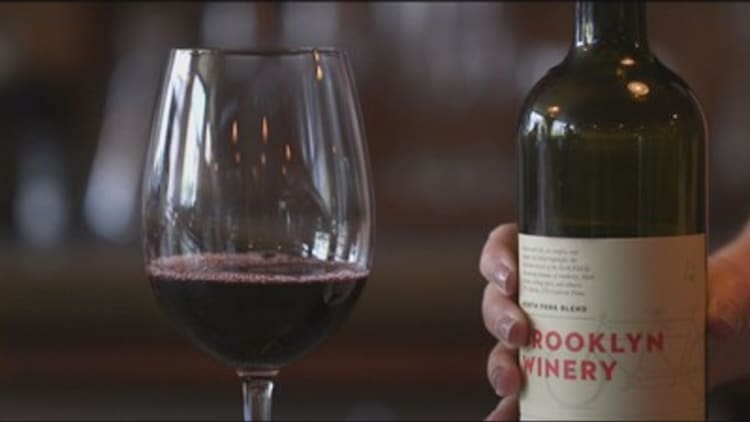When you think of wineries, rolling vineyards in Napa Valley or the Finger Lakes may come to mind. But Brian Leventhal and John Stires want you to think of Brooklyn.
The entrepreneurs co-founded Brooklyn Winery in 2010 after meeting at an internet startup years earlier in 2007. They liked wine and knew a bit about it, after having participated in several years of team-building exercises with their coworkers making and bottling their own wines.
"Each year we made a different vintage, and went through the entire process from fermentation all the way through bottling with our own custom label," Stires recalls.
The only problem? "One of the pain points was getting out to New Jersey. None of us had cars, so we were taking the subway, train, or the bus, and then walking a mile to get to this place."
That got them wondering why this wasn't being done in the New York City area. So Stires and Leventhal decided, Who better to give it a go? They got to planning and decided to quit their jobs in 2010 with only a business plan in place — no space, capital, or winemaker lined up. But they felt confident their concept would take off.
Plus, they had nothing to lose. They weren't in their dream careers and did not yet have children to support.
"You start thinking, 'What's the worst that can happen if we try and fail?'" Leventhal says. "And the way we looked at it, that was not nearly as bad as not trying at all."
The friends officially launched Brooklyn Winery in Williamsburg in October 2010, raising about $1 million from friends and family to renovate an 8,000 square foot building that's had several lives: a former creamery, a pickle factory, and most recently, a nightclub. The co-founders really bootstrapped the operation, even renovating the space themselves to keep costs down.
"We were working every day, hammering and sheet rock painting — it's given us a much greater appreciation of where we are," Leventhal says.
The business opened with a simple concept: it would make and bottle wine and offer a small menu of options for food. But once they opened, they adjusted to customer demand.
"People started saying, 'The space is beautiful and I love wine — do you do weddings?'" Stires recalls. The answer was no, but they soon changed their business model and began holding events. Today, about 75 percent of the winery's business comes from hosting weddings and other parties.
Brooklyn Winery's wine business itself is also gaining traction. In its first year, Brooklyn Winery made 2,500 cases of wine. Today, at full capacity, they are making between 8,000 and 9,000 cases per year. Revenue totaled $5.2 million in 2015, with growth projected for this year as well.
They sell close to 20 different wines featuring imported grapes from all over the country, taken through the full wine-making process on site. Bottles retail for around $20 to $30 a bottle in their store, online, and in other local retailers.
Today the business has grown to 80 employees and it recently opened up a new bar and restaurant called BKW in the Crown Heights section of Brooklyn. In 2017 they are planning to open a winery in Washington, D.C., with the same concept as Brooklyn Winery, but larger.
"The nice thing about being an urban winery is that we have the ability to focus on grapes from a lot of different regions. We are pulling fruit from New York State, Northern California, Washington and Oregon — we bring all of that here and can really make a diverse portfolio," Leventhal says.
Beyond making great wine, Stires and Leventhal have now made their dream jobs into a profitable and rewarding reality.
"There's nothing better and more fulfilling in life than our job of making people happy, whether it's just selling them a bottle of wine they will take home and drink, enjoying a glass at the wine bar or celebrating one of the most important days of their lives with us," Leventhal says. "And being able to create that experience, there's nothing better than that."



